In today's fast-paced academic environment, AI tools for research have become indispensable. These tools streamline various stages of the research process, enhancing efficiency and productivity. In this article, we delve into the top AI tools that can transform your research process, making it more efficient, insightful, and impactful.
Part 1. Is There an AI Tool to Find Research Paper/Write Research Paper?
Yes, AI tools can significantly aid in the research process by finding and managing research papers and even assisting in writing them.
One such tool is UPDF, which is particularly useful for researchers. UPDF leverages AI to enhance various aspects of note-taking and PDF document management. With its intelligent search capabilities, UPDF's AI assistant allows researchers to quickly find relevant information within their documents. The tool also offers automated summarization, which helps in quickly providing the key points of lengthy research papers. Additionally, UPDF's annotation features make it easy to highlight important sections and add notes, streamlining the process of organizing thoughts and references. By efficiently managing PDF files, UPDF helps researchers keep their materials well-organized and easily accessible, ultimately saving time and enhancing productivity.
Windows • macOS • iOS • Android 100% secure
Part 2. Top AI Tools for Each Stage of the Research Process
UPDF is a versatile AI-powered PDF tool that supports researchers throughout every stage of their work. From AI summarizing information and organizing notes to drafting and reviewing the final paper, UPDF's features streamline each step, enhancing efficiency and ensuring thorough, well-managed research. Here's how it can help in each stage:
LitMaps for Literature Review
LitMaps aids researchers in the literature review process by dynamically mapping and visualizing citation networks. This helps identify relevant papers, track research trends, and discover key studies, ensuring a comprehensive and up-to-date understanding of the research landscape. It streamlines the literature review by connecting related works efficiently.
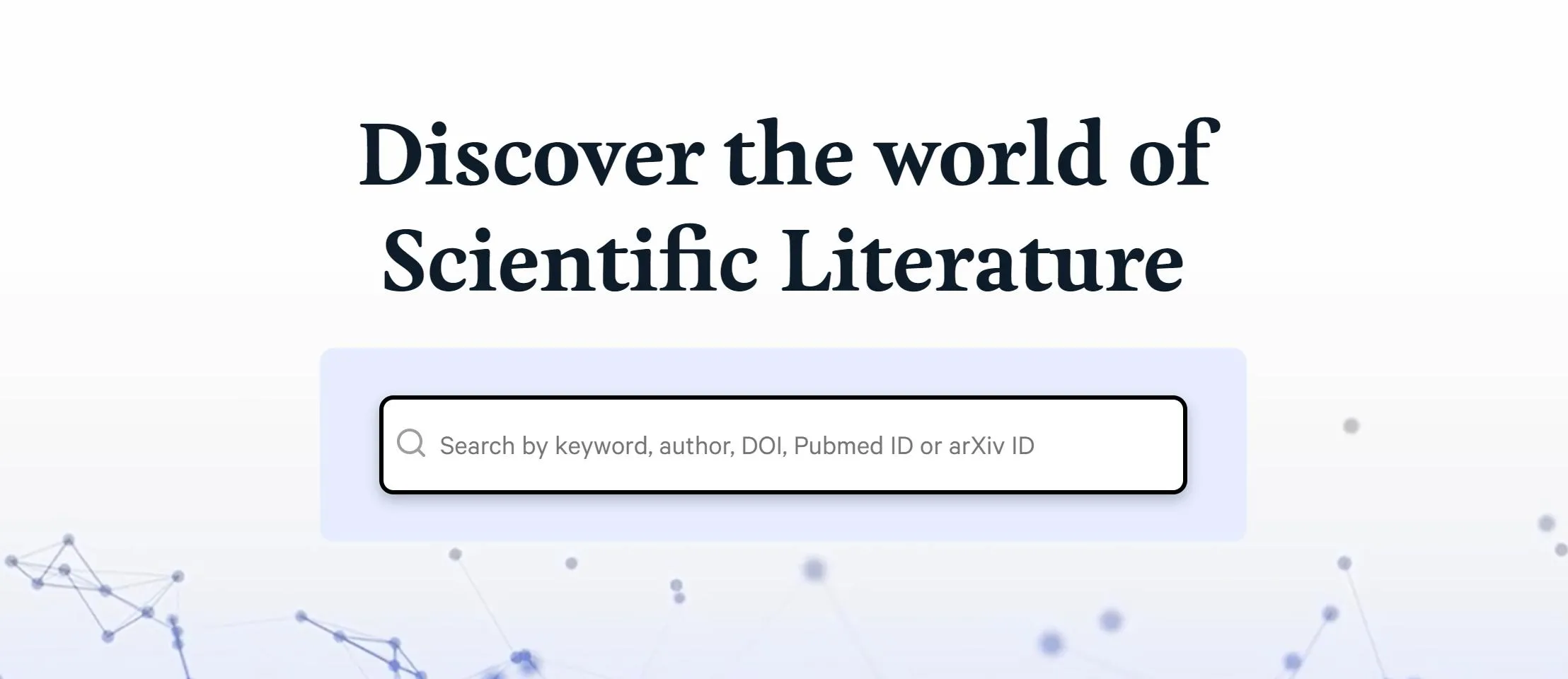
Pros:
- Search Academic Papers: Access over 260 million academic papers.
- Mind Mapping: Visualize research with interconnected article maps and annotations.
- Dynamic Exploration: Explore research from various angles by rearranging papers on the map.
- Collaboration: Share research maps with colleagues, students, or advisors.
Cons:
- Limited Free Plan: Unlimited searches available only on paid plans.
Litmaps offers a free plan with paid plans starting at US$10 per month.
ChatGPT for Data Analysis
ChatGPT assists researchers with data analysis by providing insights, generating summaries, and suggesting analytical approaches. It can interpret complex data sets, answer specific queries, and even help in coding statistical analyses, making data interpretation more accessible and efficient for researchers at all levels.
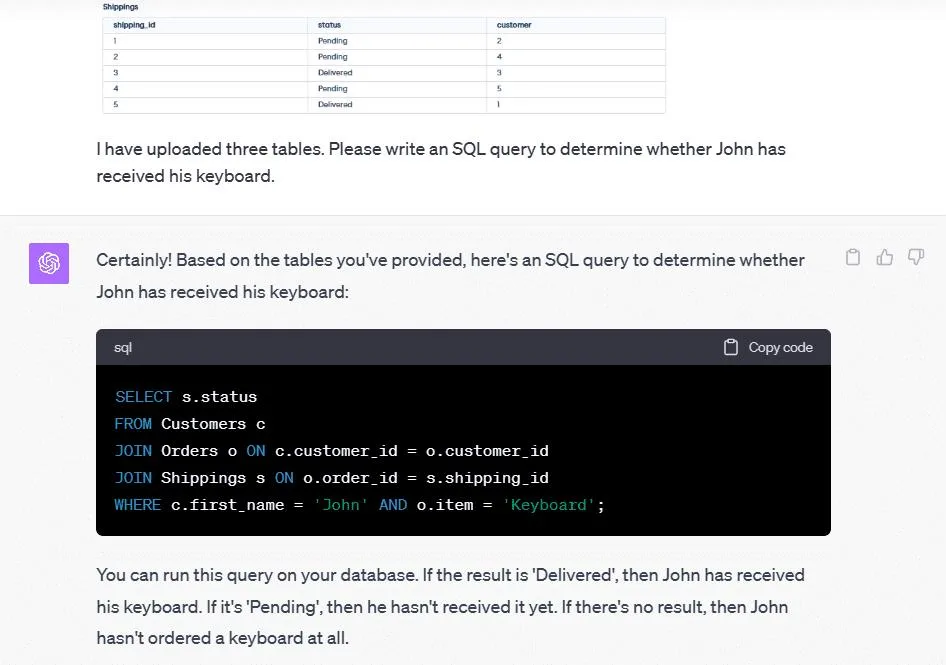
Image source: KDnuggets
Pros:
- Insight Generation: Provides summaries and interpretations of complex data.
- Query Responses: Answers specific data-related questions.
- Analytical Assistance: Suggests approaches and methods for data analysis.
Cons:
- Limited Accuracy: May provide incorrect or overly general insights.
ChatGPT is available for free but has premium tiers to access their most advanced models.
Jenni for Drafting the Research Paper
Jenni AI helps researchers draft their papers by offering AI-powered writing assistance. It provides real-time suggestions, enhances clarity, and ensures coherent structure. Jenni AI can generate content, refine arguments, and improve the overall quality of the paper, making the drafting process more efficient and effective.
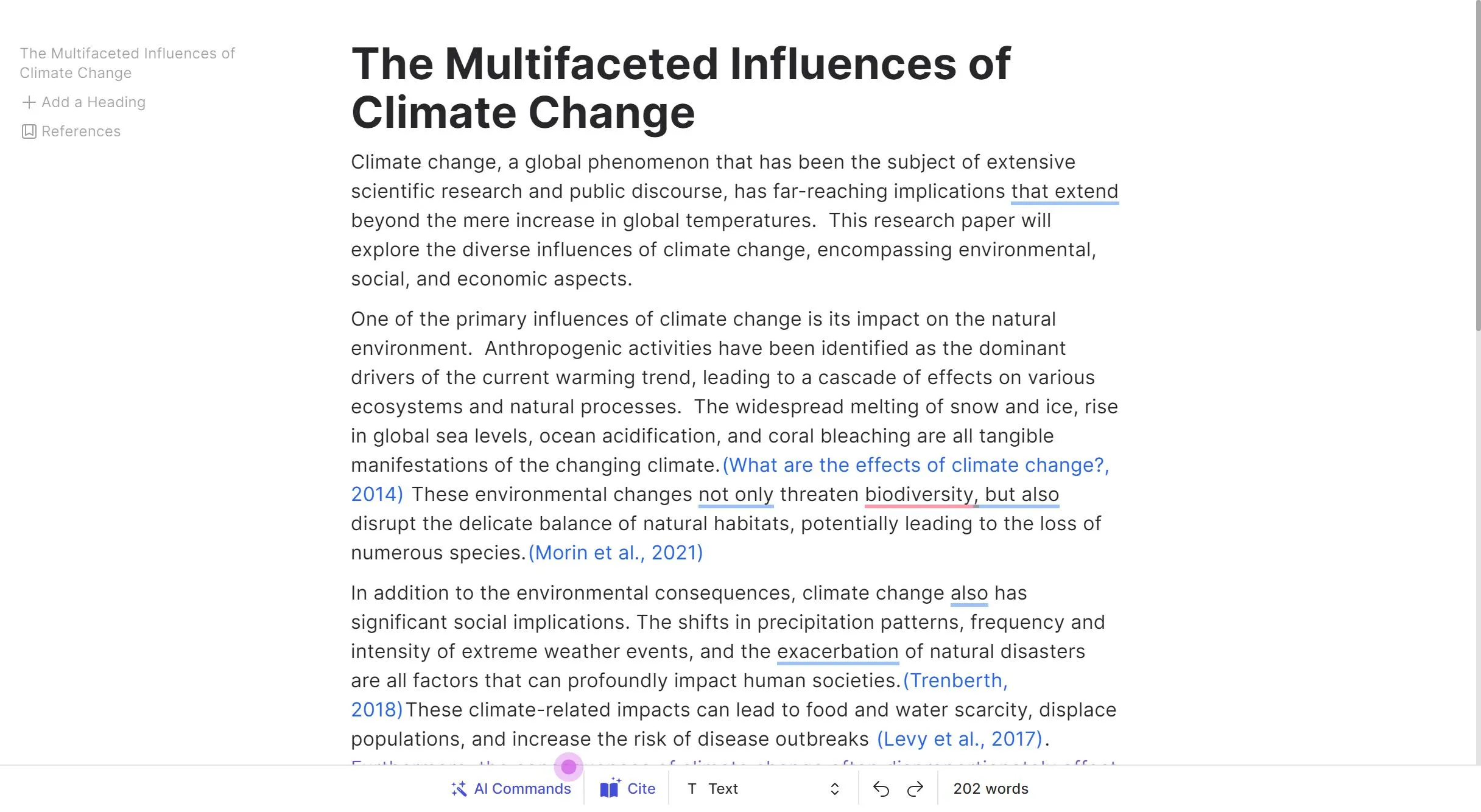
Generated by Jenni.ai
Pros:
- AskJenni: AI assistant answers research questions and clarifies documents.
- Citation Assistance: Formats citations in APA, MLA, and Chicago styles.
- AI Commands: Performs paraphrasing, rewriting, and text simplification.
- AI Autocompletion: Suggests and completes sentences for faster writing.
Cons:
- Limited Content Types: Offers fewer content types compared to other AI writing tools.
Jenni offers a free plan with paid plans starting at US$20 per month.
UPDF for Reviewing and Editing
UPDF's annotation and editing features are invaluable during the review and editing stages. Researchers can highlight sections that need revision, add comments, and make direct edits to the PDF. The tool's AI-driven suggestions help improve the clarity and quality of the writing, making the review process more efficient.
Pros:
- Annotation Tools: Easily add comments, highlights, and notes.
- AI-Powered Summarization: Quickly grasp key points and main arguments.
- Collaborative Features: Share documents for collaborative review and feedback.
- Search Function: Find and revise specific sections efficiently.
- Free Trial: Free trial provided.
Cons:
- It needs subscribe to access some premium features.
Download UPDF and try it out for free.
Windows • macOS • iOS • Android 100% secure
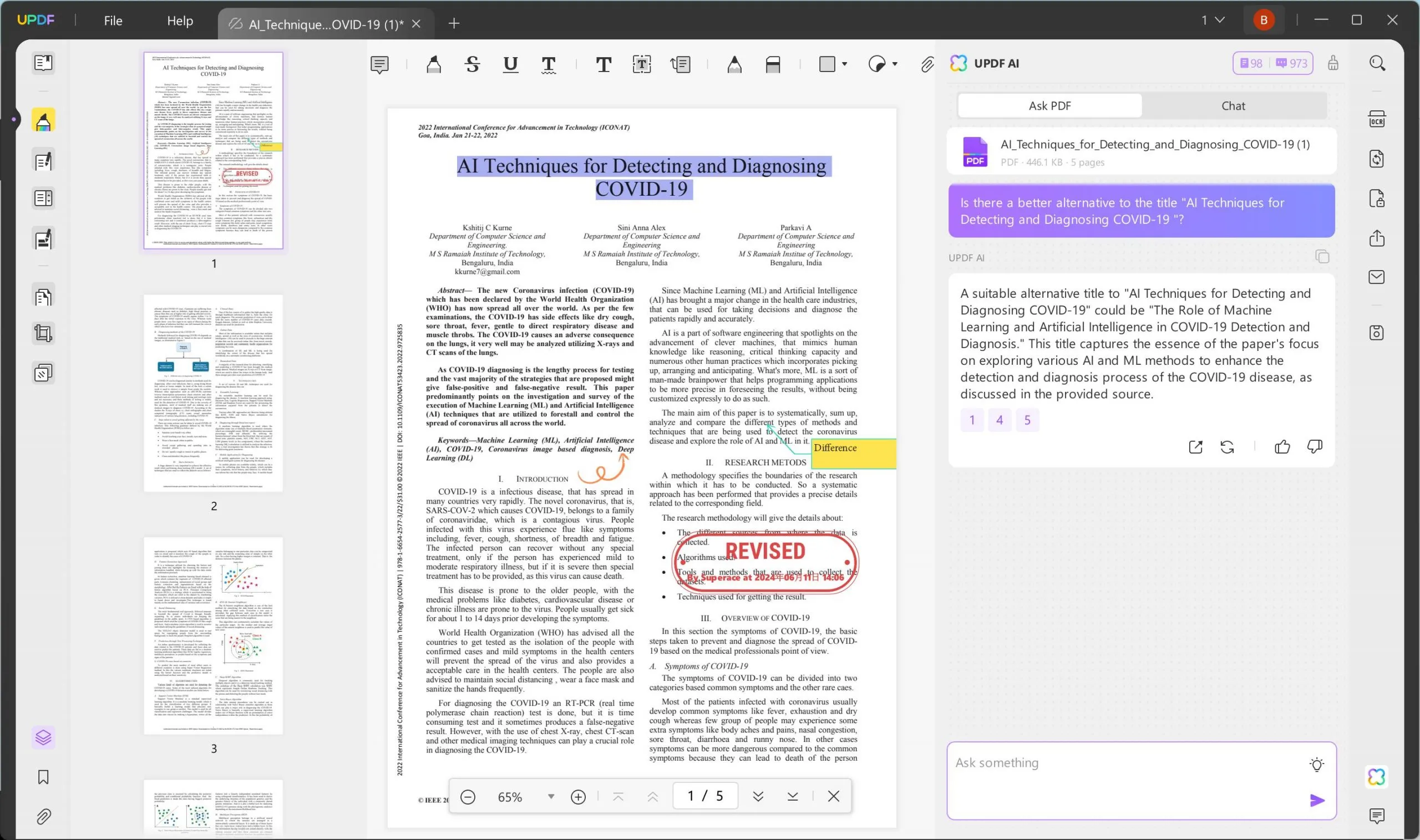
UPDF has a free trial available. However, once the trial ends, the PDF tool subscriptions start at US$39.99 a year. You can check more details on the pricing page.
Scite for Citing and Formatting Sources
Scite helps researchers with citations by providing smart citation analysis. It shows how a paper has been cited, including supportive, contrasting, and mentioning citations. This feature ensures accurate and comprehensive referencing, helping researchers validate their sources and enhance the credibility of their work.
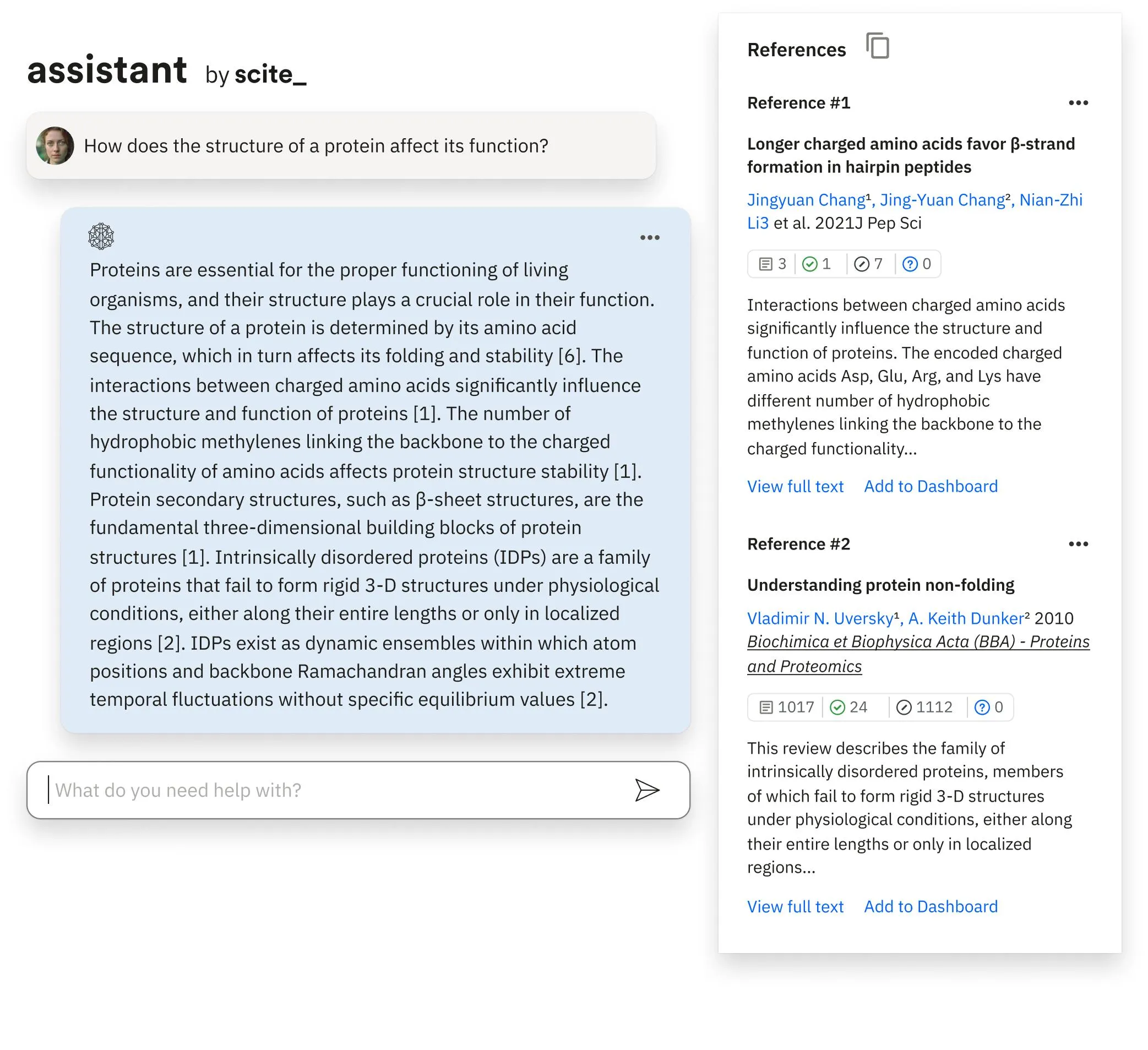
Pros:
- Smart Citations: Analyzes references to show support, contradiction, or mentions.
- Citation Context: Reveals how different sections are cited by other researchers.
- Citation Reports: Identifies citation patterns and trends.
- Large Dataset: Trained on over 187 million articles and datasets.
Cons:
- Limited Access: Not all cited articles are accessible due to publisher restrictions.
Scite offers a limited free trial with plans starting at US$20 per month.
Each of these tools are great to have throughout the research process. UPDF, in particular, is especially powerful when paired with any of the above tools. Whether you need accurate summaries of research or an effective proofreading tool, check out UPDF today to enhance your research efficiency. Start enhancing your research process today by downloading UPDF and exploring its powerful AI features.
Part 3. Deep Dive: How to Utilize UPDF's AI Features During the Research Process
Building on the versatility of UPDF, let's explore its specific PDF and AI features in more detail. In this section, we'll dive into how the notes, summarize, translate, and explain features can enhance your research process, making each step more efficient and productive.
Taking Notes with UPDF
UPDF's note-taking features are designed to streamline the research process by making document annotation intuitive and comprehensive. Researchers can add comments directly to the text, providing space for thoughts, insights, and questions that arise during reading. Text markups, such as highlights and underlines, help emphasize key points and important data. The pencil and eraser tools offer a freeform option for sketching diagrams or manually annotating documents, while the measure tool is useful for accurately assessing and documenting data in graphs and tables.
Adding shapes, stickers, and stamps provides a visual way to organize and highlight information, making the review process more engaging. Attachments can be added to integrate supplementary materials, ensuring all relevant data is in one place. Comment properties allow customization, making annotations easy to navigate. The undo/delete annotations feature ensures that the note-taking process is flexible and non-destructive, allowing for easy corrections and updates. These tools collectively enhance the efficiency and organization of research documentation.
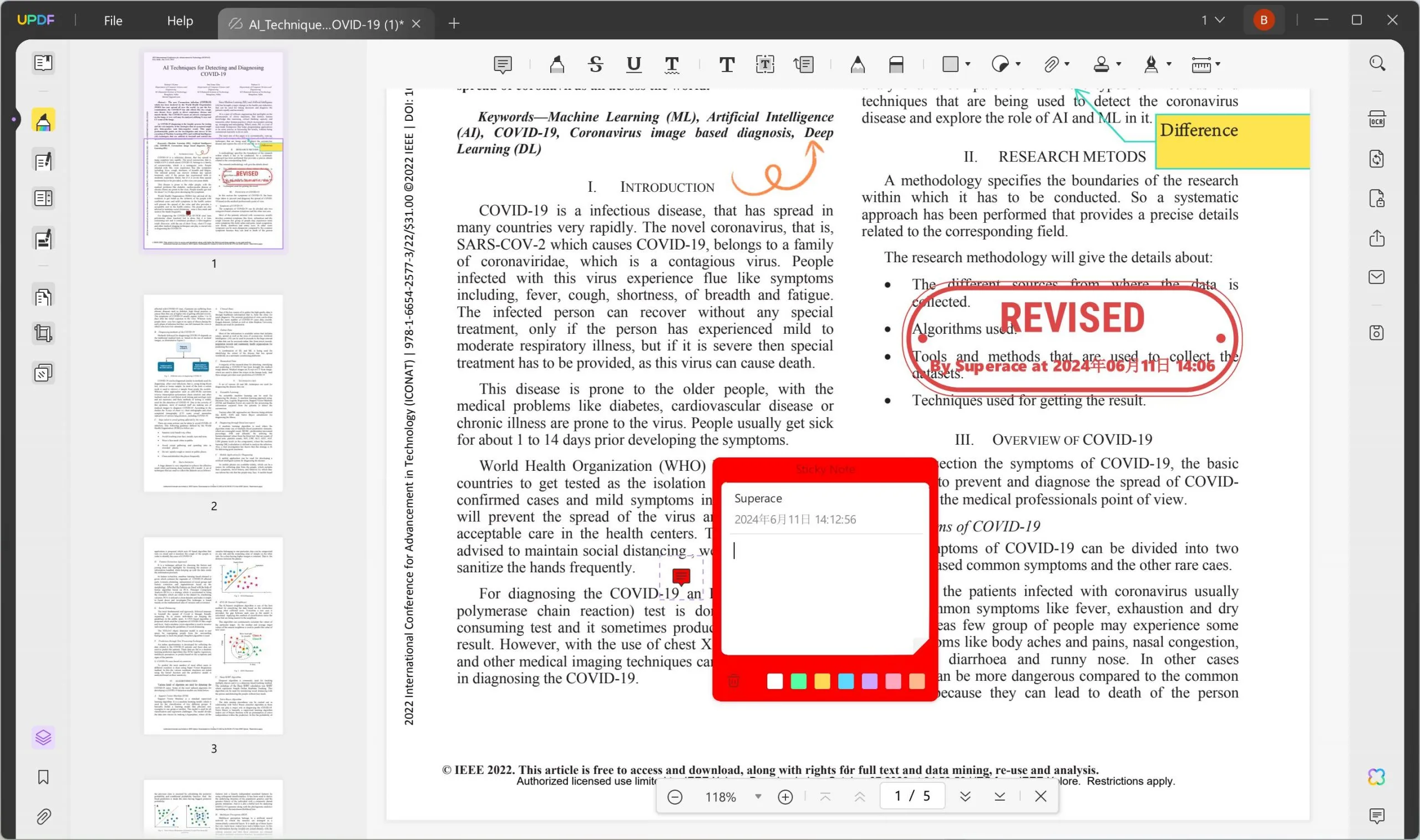
Summarize with UPDF
UPDF's AI-powered summarize feature is a game-changer for researchers dealing with lengthy documents. This tool integrates AI to help you summarize PDFs directly, saving time and protecting document information from being leaked. With UPDF, you can generate summaries without switching tools, enhancing efficiency and security in your research process.
- Whole Document Summary: UPDF can summarize an entire PDF, allowing researchers to quickly grasp the main points and overall objectives of lengthy documents. This is particularly useful for getting an overview of extensive literature or complex reports. For example, you can use suggested prompts on the page or you can prompt UPDF AI with, "Extract the main arguments or conclusions from this document," or "Summarize the methodologies used."
- Page-Specific Summary: If you need to focus on specific sections, UPDF allows summarizing individual pages. This feature is perfect for extracting key information from data-heavy pages or specific chapters. You might use prompts like, "Summarize page 5 in bullet points," to quickly distill critical information.
- Partial Text Summary: UPDF also supports summarizing selected text. While reading or commenting on a PDF, you can highlight any section and ask UPDF AI to summarize it. This helps in focusing on relevant paragraphs or sections without losing context. Prompts such as "Summarize this paragraph" or "Explain this section in simple terms" can be very effective.
These features make UPDF an indispensable tool for managing and understanding large volumes of research data, ultimately enhancing productivity and comprehension.
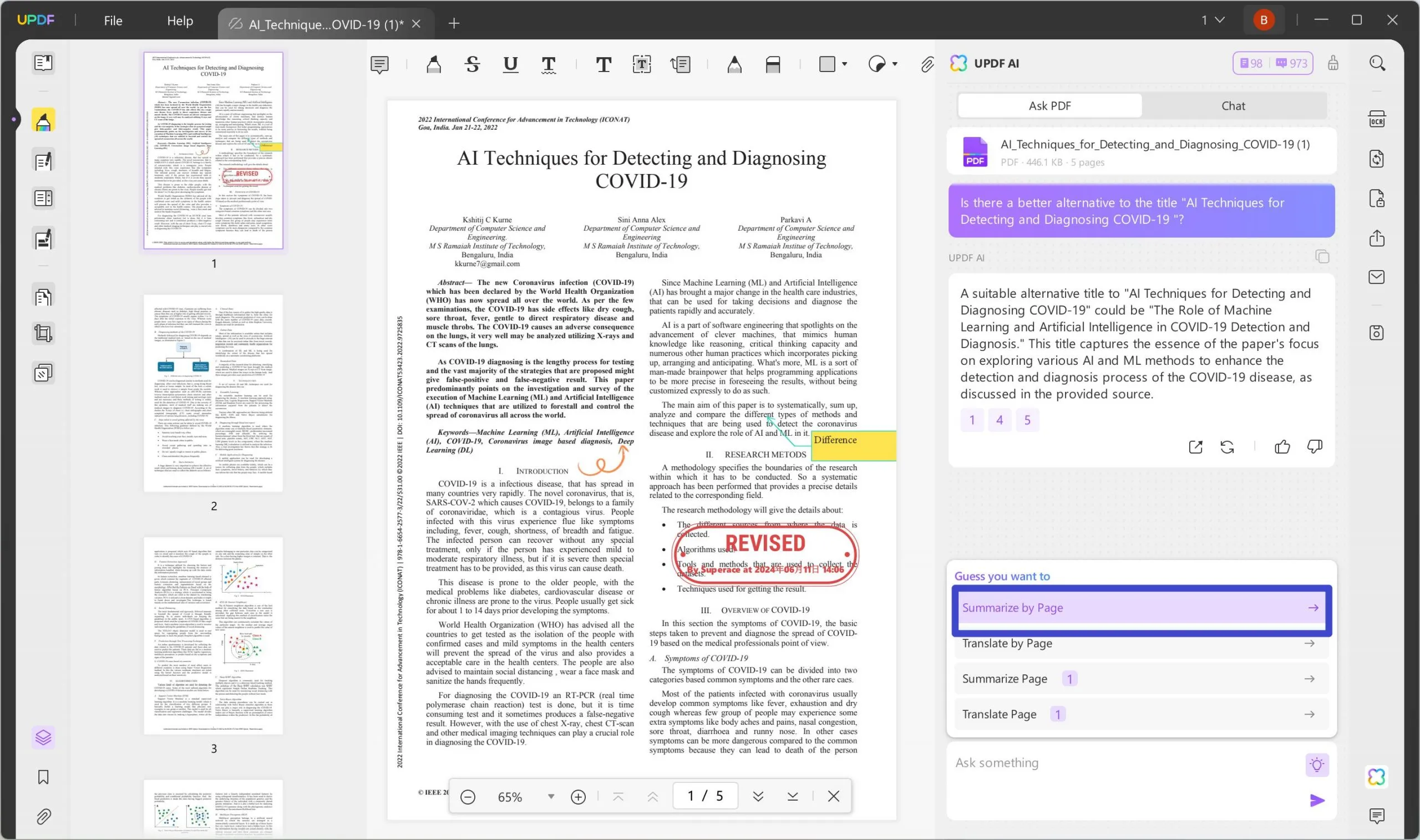
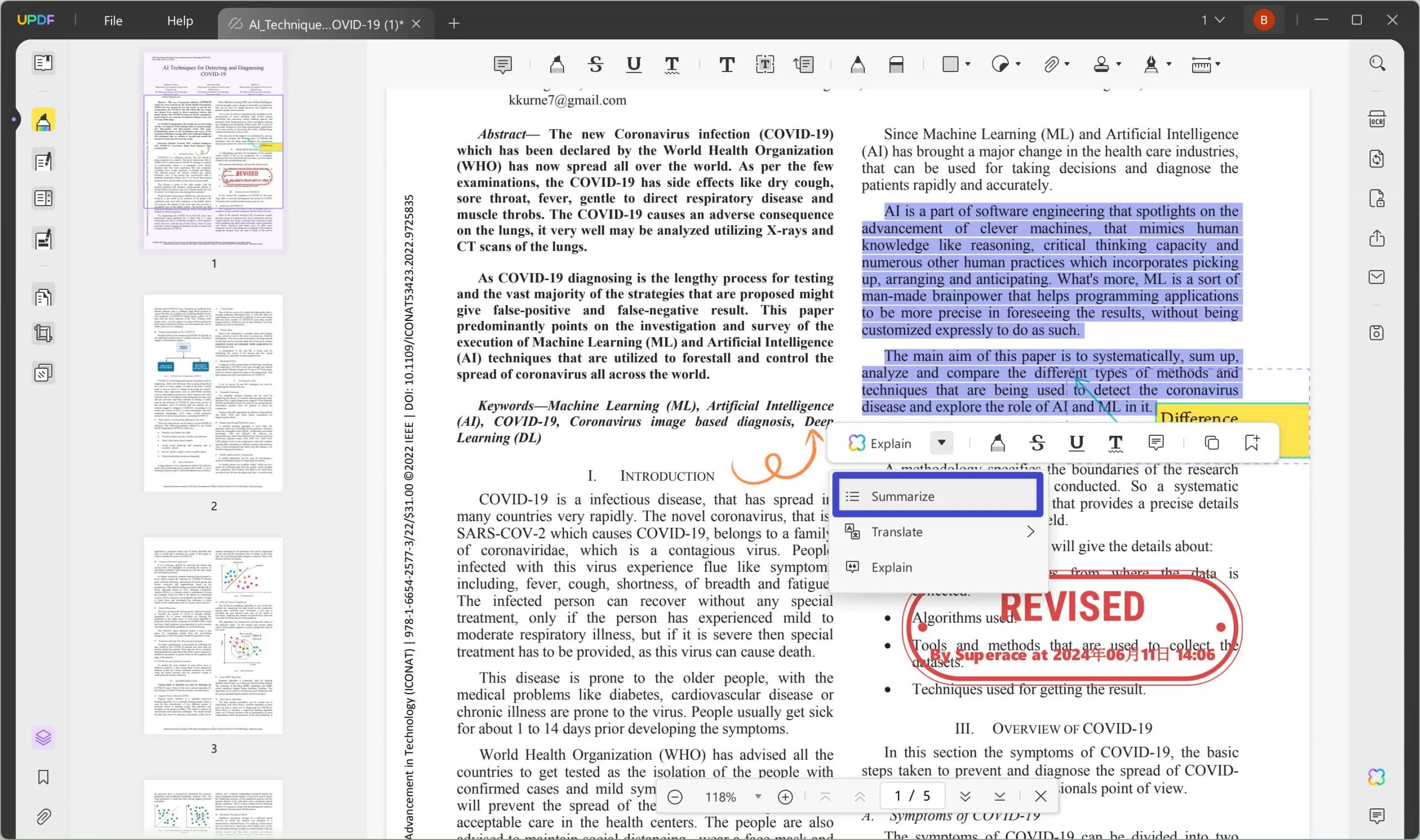
Translate with UPDF
UPDF's AI-powered translation feature simplifies the process of translating PDF documents, making it a valuable tool for researchers working with multilingual sources. This feature integrates ChatGPT to provide seamless translations directly within the PDF, saving time and ensuring data security.
- Whole Page Translation: UPDF can translate entire pages of a PDF into various languages, which is particularly useful when dealing with comprehensive research articles in foreign languages. This allows researchers to quickly understand the content without needing external translation tools. For instance, you can prompt UPDF AI with, "Translate page 5 into French," to get a full-page translation instantly.
- Text Selection Translation: For more focused translations, UPDF enables users to translate specific sections of text while reading. This is beneficial for researchers who need to translate only relevant parts of a document, such as key findings or important data. Prompts like, "Translate this paragraph into Spanish," can be used to translate selected text efficiently.
- Copy-Paste Translation: UPDF also supports translating text that is copied and pasted into the tool, even if it's not part of the original PDF. This feature is perfect for researchers who need to translate excerpts from various sources quickly. You can use prompts like, "Translate these sentences into German: [paste text]."
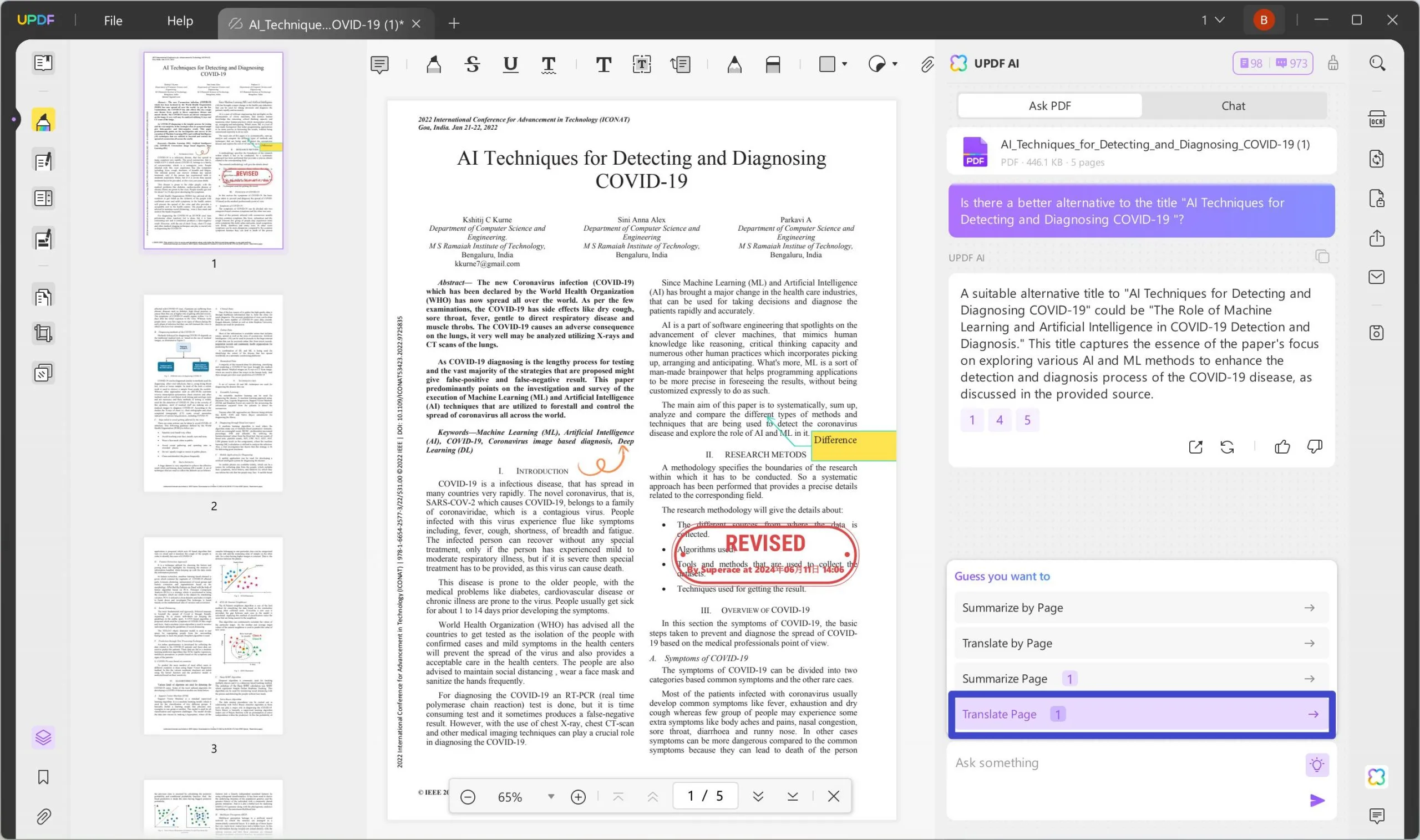
These translation capabilities make UPDF an essential tool for researchers working with international literature, enabling them to access and understand content in multiple languages, thereby broadening their research scope and improving accuracy.
Explain with UPDF
UPDF's AI-powered explain feature is incredibly useful for researchers dealing with complex or technical texts. This tool helps break down difficult paragraphs or concepts, making them easier to understand. By using the "Ask PDF" mode, you can select any challenging text and prompt UPDF AI to explain it in simpler terms. For instance, you can type, "Explain: [paste the copied text here]," and UPDF will provide a detailed and comprehensible explanation. This feature ensures that researchers fully grasp the material, enhancing comprehension and facilitating more effective analysis and synthesis of the information.
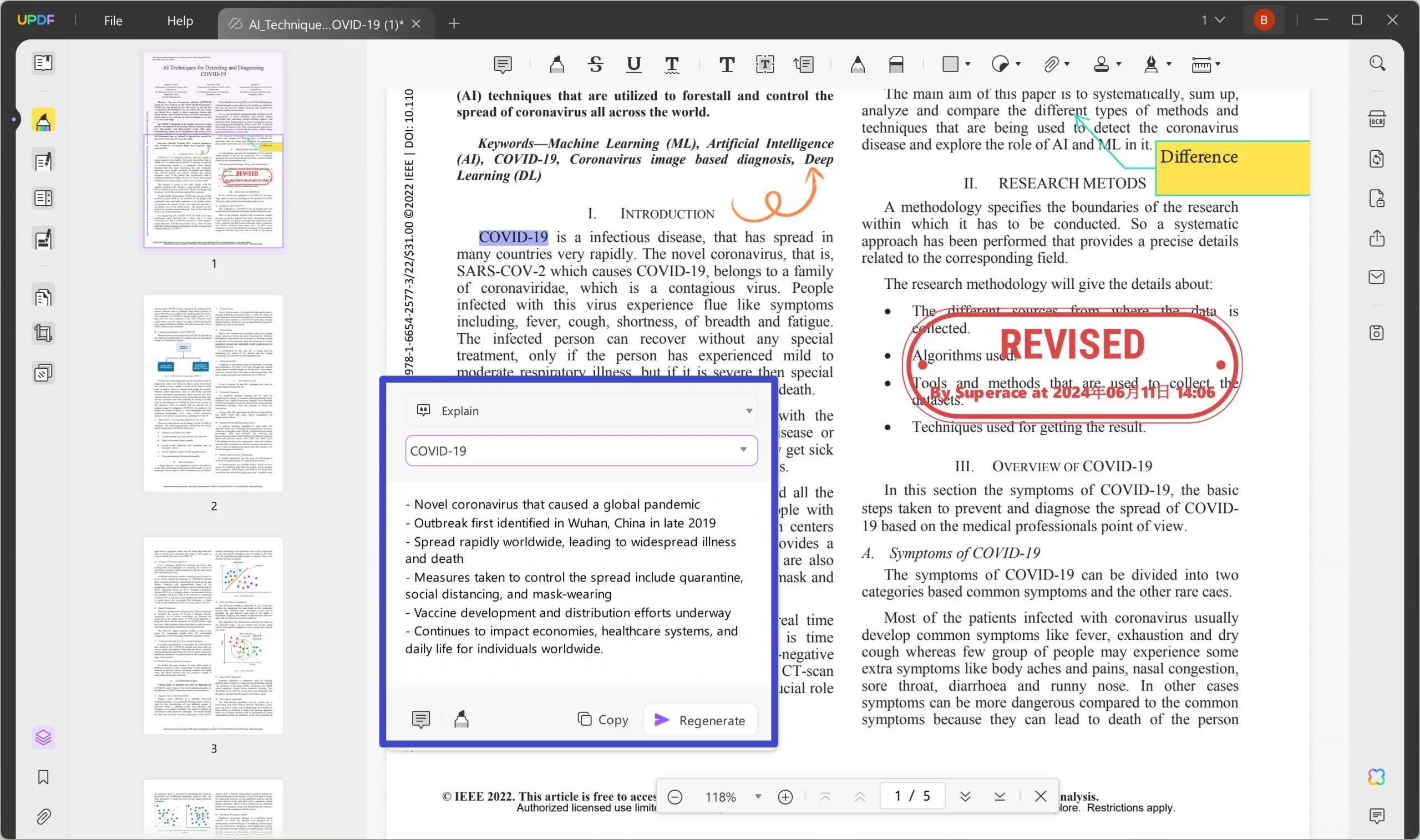
Conclusion
In conclusion, incorporating AI tools like LitMaps, ChatGPT, Jenni AI, and Scite can significantly enhance your research process. These tools streamline each phase, from literature review to drafting and citing sources. Experience the benefits firsthand by also trying UPDF, which offers comprehensive features to further support your research efforts.
Windows • macOS • iOS • Android 100% secure
 UPDF
UPDF
 UPDF for Windows
UPDF for Windows UPDF for Mac
UPDF for Mac UPDF for iPhone/iPad
UPDF for iPhone/iPad UPDF for Android
UPDF for Android UPDF AI Online
UPDF AI Online UPDF Sign
UPDF Sign Edit PDF
Edit PDF Annotate PDF
Annotate PDF Create PDF
Create PDF PDF Form
PDF Form Edit links
Edit links Convert PDF
Convert PDF OCR
OCR PDF to Word
PDF to Word PDF to Image
PDF to Image PDF to Excel
PDF to Excel Organize PDF
Organize PDF Merge PDF
Merge PDF Split PDF
Split PDF Crop PDF
Crop PDF Rotate PDF
Rotate PDF Protect PDF
Protect PDF Sign PDF
Sign PDF Redact PDF
Redact PDF Sanitize PDF
Sanitize PDF Remove Security
Remove Security Read PDF
Read PDF UPDF Cloud
UPDF Cloud Compress PDF
Compress PDF Print PDF
Print PDF Batch Process
Batch Process About UPDF AI
About UPDF AI UPDF AI Solutions
UPDF AI Solutions AI User Guide
AI User Guide FAQ about UPDF AI
FAQ about UPDF AI Summarize PDF
Summarize PDF Translate PDF
Translate PDF Chat with PDF
Chat with PDF Chat with AI
Chat with AI Chat with image
Chat with image PDF to Mind Map
PDF to Mind Map Explain PDF
Explain PDF Scholar Research
Scholar Research Paper Search
Paper Search AI Proofreader
AI Proofreader AI Writer
AI Writer AI Homework Helper
AI Homework Helper AI Quiz Generator
AI Quiz Generator AI Math Solver
AI Math Solver PDF to Word
PDF to Word PDF to Excel
PDF to Excel PDF to PowerPoint
PDF to PowerPoint User Guide
User Guide UPDF Tricks
UPDF Tricks FAQs
FAQs UPDF Reviews
UPDF Reviews Download Center
Download Center Blog
Blog Newsroom
Newsroom Tech Spec
Tech Spec Updates
Updates UPDF vs. Adobe Acrobat
UPDF vs. Adobe Acrobat UPDF vs. Foxit
UPDF vs. Foxit UPDF vs. PDF Expert
UPDF vs. PDF Expert



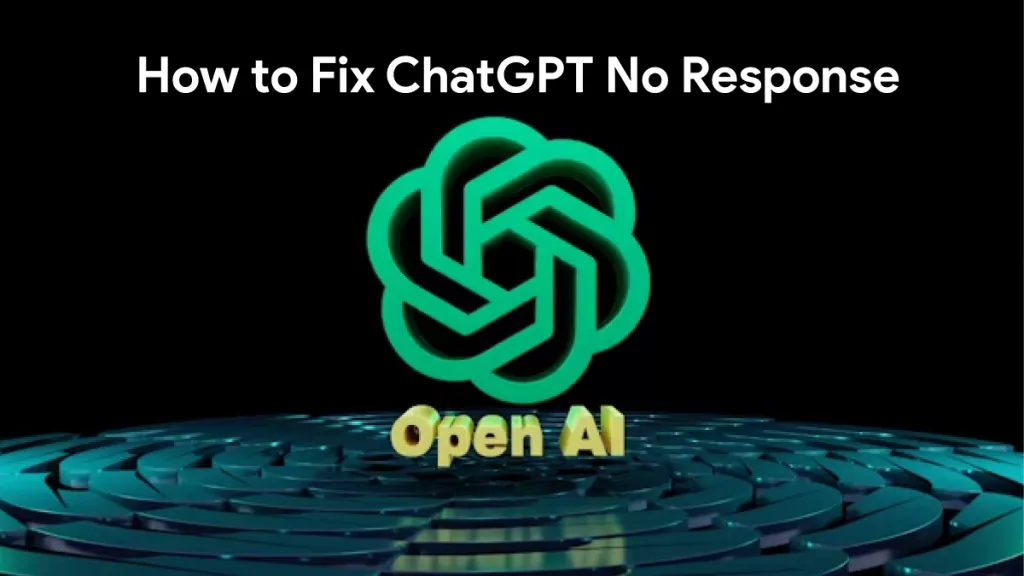





 Enrica Taylor
Enrica Taylor 
 Grace Curry
Grace Curry 

 Enola Davis
Enola Davis 
 Lizzy Lozano
Lizzy Lozano 